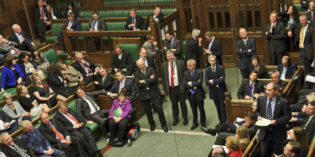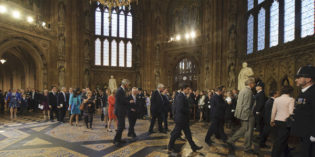
‘Use it or lose it?’ Why the ability to vote shouldn’t depend on actually doing so
The US Supreme Court has ruled that Ohio’s controversial plans to remove habitual non-voters from the electoral register is constitutional. Christopher Stafford argues that such a measure has serious consequences for encouraging democratic participation – and there are better ways of ensuring the accuracy of the electoral register.

How the partisan context of parliamentary votes affects MPs’ party loyalty on free votes
To measure the extent to which MPs make decisions about how to vote out of agreement with a policy or party loyalty, Christopher D. Raymond measured the variation in MPs’ voting behaviour in a series of free votes. He found that the closeness of each parliamentary division affected MPs’ voting behaviour, indicating that loyalty to their party, and the desire for a partisan win, has an effect independently of an MP’s own position and the party whip.

A changing democracy: the British political tradition has never been more vulnerable
Never before has the British political tradition been more contested, write Matthew Hall, David Marsh and Emma Vines. They explain that British democracy is facing three major challenges – Scottish independence, Brexit, and anti-politics – and these have the potential to force change on an otherwise stale political establishment.

We need to talk (more) about deliberative democracy in the EU
Criticism of the EU’s ‘democratic deficit’ has become increasingly prominent since the financial crisis. Firat Cengiz writes that democracy in the EU would benefit from methods allowing citizens to participate more directly in policymaking. She argues for a form of deliberative democracy to be implemented at the European level and provides some practical suggestions for how this could be achieved.

Why the Grieve amendment to the EU Withdrawal Bill is not unconstitutional
On Wednesday, 20 June, the House of Commons will consider again amendments to the EU Withdrawal Bill intended to give Parliament a meaningful vote on the Brexit negotiations, particularly in the case of no deal being agreed. Ben Margulies considers the constitutional implications of these highly contentious proposals.

Maine’s election shows that ranked-choice voting is popular in the US right now. But we have been here before.
Voters in the Pine Tree State have chosen to continue using ranked-choice voting in state-wide elections. Jack Santucci explains that ranked-choice voting is likely to be adopted in polarised political environments, creating majorities where there currently are none, and as a reaction to unpopular politicians who have won without majorities of votes. He reminds us that the current era of polarisation is similar to that of one hundred years ago, the last time ranked-choice voting was in fashion.

Book Review | Against Meritocracy: Culture, Power and Myths of Mobility by Jo Littler
In Against Meritocracy: Culture, Power and Myths of Mobility, Jo Littler offers a rich analysis that intricately teases out the grasp ‘merit’ and ‘meritocracy’ have on everyday cultural and social narratives of value and power in contemporary society. This is a rewarding contribution to the shared work of challenging hegemonic, neoliberal myths that uphold the status quo, recommends Sarah Burton, and to the building of a better and fairer world.

Reproducing the political class: how socialisation makes MPs more loyal to their parties
What are the drivers of party discipline in the House of Commons? Evidence from survey data suggests that the socialisation process of new MPs as they learn from colleagues is a key factor in their subsequent loyalty, writes Nicholas Dickinson.






 Democratic Audit's core funding is provided by the Joseph Rowntree Charitable Trust. Additional funding is provided by the London School of Economics.
Democratic Audit's core funding is provided by the Joseph Rowntree Charitable Trust. Additional funding is provided by the London School of Economics.